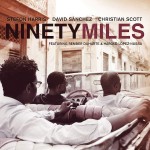Ninety Miles is the distance between Miami and Havana, the closest points in the US and Cuba. This project, the companion CD to a documentary due later this summer, comes from New Orleans-born trumpeter Christian Scott, Puerto Rican saxophonist David Sánchez, and New York vibraphonist Stefon Harris. It’s the latest in a long line of artistic efforts to bridge that divide and emphasize the musical, cultural and historical kinships between the two nations. For Scott, as for many New Orleans musicians, the similarities hit close to home. He says in the documentary: “You want to make music there because you can tell that the people have a steady diet of good music…It’s like the music makes the people feel like everything’s gonna be okay.” He’s talking about Cuba, but he may as well be talking about his hometown, especially when he goes on to call music in Cuba a kind of communal catharsis.
Recorded in Havana, the music on Ninety Miles displays the Caribbean roots that connect traditional Cuban music with US jazz and New Orleans, but it looks relentlessly forward. Scott, Harris, and Sánchez, along with the Cuban pianists Rember Duharte and Harold López-Nussa, whose separate quartets fill out the album, are modern jazz players through and through. Their compositions are ambitious, harmonically and rhythmically complex, and diversely influenced. After a couple of listens, it’s easy to distinguish between Harris’ blues-gospel melodies, the Afro-Cuban bebop Sánchez studied in Dizzy Gillespie’s band, and Scott’s wide-ranging jazz fusion. Each is a virtuosic performer in his own right, and the real pleasure in Ninety Miles is when the whole band gets cooking. The interplay between these masters and the expert rhythm sections behind them moves the project well past its efforts in musicology or history. This is a session, not a study. Communal catharsis, indeed.
Buy Stefon Harris, David Sánchez, and Christian Scott’s Ninety Miles on iTunes





